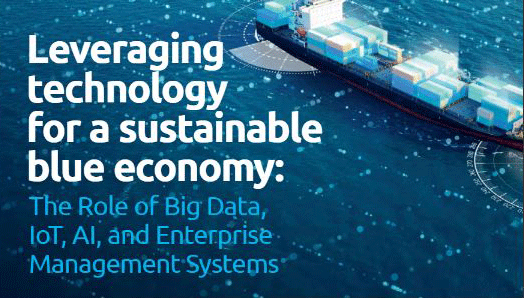Sustainable Blue Economy in Maritime Logistics: How Big Data, IoT, AI & EMS Drive Innovation

As global trends toward sustainability and digital transformation continue to shape the future, the maritime industry, particularly in the Caribbean, stands at a defining juncture.
Echoing the sentiments of Mr. Arsenio Dominguez, Director of IMO’s Marine Environment Division, during the Our Ocean Conference in Panama City on March 2, 2023, “Protecting our oceans is essential to ensuring a sustainable future for our planet.” This call to action underscores the necessity for the maritime sector to embrace advanced technology alongside the principles of the Blue Economy to safeguard ocean resources while fostering economic growth, improving livelihoods, and maintaining the health of our ocean ecosystems.
The Blue Economy, crucial for the Caribbean’s prosperity, demands the adoption of sustainable maritime practices that fully leverage technologies such as Big Data, IoT, AI, and Enterprise Management Systems. It is through this synergy that we can work together towards a sustainable and prosperous ocean economy, ensuring that no one is left behind.
Using Big Data for Sustainable Maritime Logistics
Big Data refers to the vast volumes of data generated from various sources, including maritime operations. It facilitates data-driven decision-making, significantly enhancing operational efficiency and sustainability. In the realm of port operations, the application of Big Data can revolutionize vessel tracking and cargo handling, leading to optimized throughput and reduced environmental impact.
Warehouses can leverage predictive analytics for enhanced inventory control and demand forecasting, minimizing waste and aligning with sustainable logistics practices. For freight forwarders and shipping agents, utilizing analytics provided through software like ADVANTUM Freight and ADVANTUM Warehouse enables more streamlined and effective shipment scheduling and processing. This holistic approach not only supports the sustainable goals of the Blue Economy but also enhances global supply chain resilience.
How IoT Improves Maritime Supply Chain Connectivity
The Internet of Things (IoT) connects physical devices over the internet, allowing them to communicate and exchange data. This interconnectivity allows for seamless data exchange and real-time monitoring, significantly improving operational transparency and efficiency. Ports, for example, employ IoT solutions for vessel tracking, enhancing navigational safety and port throughput. Warehouses benefit from IoT through advanced inventory management systems, which ensure accurate stock levels and reduce unnecessary resource use. Shipping agents and freight forwarders utilize IoT for dynamic scheduling and tracking, enhancing the sustainability of shipping operations by optimizing routes and reducing fuel consumption.
Optimizing Maritime Operations with AI
Artificial Intelligence (AI) represents a leap forward in how maritime operations can be optimized. AI’s capability to process vast amounts of data and learn from patterns enables predictive maintenance of vessels and port infrastructure, significantly reducing the risk of costly downtime and environmental accidents. Furthermore, AI-driven route optimization and cargo loading algorithms offer the potential to drastically cut fuel consumption and emissions, directly contributing to the maritime industry’s sustainability goals and the wider objectives of the Blue Economy.
Benefits of Enterprise Management Systems in Maritime Logistics
Enterprise Management Systems are at the forefront of streamlining maritime operations. These systems integrate various logistical components, promoting efficient data management and supporting eco-friendly paperless transactions. By facilitating seamless communication between ports, warehouses, freight forwarders, and other logistics stakeholders, these systems such as the ADVANTUM software suite enhance operational coherence and efficiency. To boost, their integration with Port Community Systems, Maritime Single Windows, and customs platforms like ASYCUDA ensures streamlined data flow, enhancing regulatory compliance and operational transparency, which are fundamental for a sustainable Blue Economy.
Shaping the Future of the Blue Economy with Technology
The integration of Big Data, IoT, AI, and Enterprise Management Systems is revolutionizing the Caribbean maritime industry, steering it towards the sustainability and efficiency mandates of the Blue Economy. These technologies offer pathways to enhance operational efficiency, minimize environmental impacts, and foster economic growth. Embracing this technological transformation requires a unified approach from all maritime stakeholders. By collaboratively leveraging these innovative solutions, the Caribbean maritime sector can realize the full potential of the Blue Economy, paving the way for a sustainable, prosperous future.
For further insights into harnessing these technologies for maritime logistics, visit www.advantumpcs.com.
Originally published in the Caribbean Maritime Magazine Issue 51
